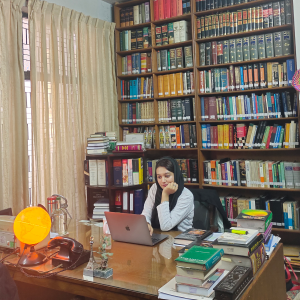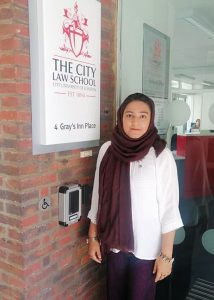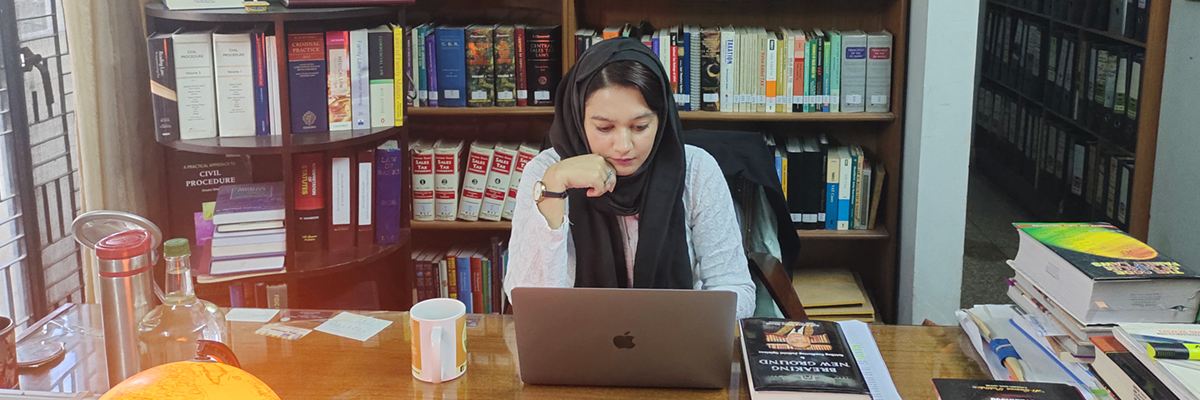Khadija Siddiqi (Bar Professional Training Course, 2019) was recently awarded a British Council Study UK Alumni Award for Social Action. Khadija is a human rights lawyer and activist in Pakistan whose conviction in her work grew as she fought for her life, and her rights, after a brutal knife attack.
 “Had it not been for this life-threatening experience, I would have continued to live in a bubble, unaware, disillusioned as to the sufferings of the disadvantaged and underprivileged segment of the society. The entire ordeal gave me a sense of direction and purpose,” Khadija Siddiqi says.
“Had it not been for this life-threatening experience, I would have continued to live in a bubble, unaware, disillusioned as to the sufferings of the disadvantaged and underprivileged segment of the society. The entire ordeal gave me a sense of direction and purpose,” Khadija Siddiqi says.
In 2016, a man she knew from university attacked her in the street, in broad daylight, wearing a motorcycle helmet. He stabbed her 23 times.
“When my sister tried to intervene as a means to prevent him, he, without any remorse, stabbed her as well.”
Doctors considered it a miracle that Khadija survived, but she still faced an uphill battle to receive legal justice.
“All around the world women are subjected to harassment, assault, and physical violence but in Pakistan, they fail to get justice no matter how heinous the nature of the offense or how viciously a female is stripped of her rights,” Khadija says.
“There was one segment of the society which continuously character assassinated and blamed me for bringing this upon me, the toxic mentality of such men was on display for all to witness, but it never deterred me from the struggle.”
Khadija’s attacker was finally convicted to seven years in jail in 2017, but this was followed by a commuted sentence before the conviction was entirely overturned. The shocking nature of the crime and the injustice made headlines across the world.
“Constant pleas fell on deaf ears, and it felt like an uphill task until finally, my voice resonated among members of the civil society, activists, anchors and eventually certain politicians as well who started to raise a voice against the injustice,” Khadija says.
On Twitter, hashtags like #justiceforkhadija and #khadijathefighter were trending.
“The more the defence attempted to destroy my reputation and crumble my morale, the more people came forward to fight for me.”
Finally, the Supreme Court in Pakistan decided to re-examine the case, and the attacker was re-convicted of his crime.
Khadija had won some kind of justice, but still needed to come to terms with what had happened to her.
“Sometimes I feel my life post-2016 was such a rollercoaster ride that I never got the chance to truly unload or process the trauma. Even though we try to contain the pain and bravely face it, we are all vulnerable,” she says.
“It was an unfathomably harrowing experience with a silver lining that unveiled the strength and power hidden beneath my skin or rather were bestowed upon me post the life-threatening incident.”
Khadija was already a law student in 2016, but her newfound insights became a deciding factor.
“The verdict in my own case affirmed within me a desperate need to continue struggling for the improvement of women’s rights in Pakistan,” she says.
 “I strive towards a system where there is equal protection of the law for everyone irrespective of their socio-economic background, where the laws are not like sieves and everyone has a voice that is not shunned at the gates of law, rather their grievances are heard, and to make the legal system more equitable for all.”
“I strive towards a system where there is equal protection of the law for everyone irrespective of their socio-economic background, where the laws are not like sieves and everyone has a voice that is not shunned at the gates of law, rather their grievances are heard, and to make the legal system more equitable for all.”
Khadija has already made a difference to many.
“Recently, I represented a transgender client, which resulted in a television channel being fined for airing derogatory remarks against the transgender community. Similarly, I represented the world-renowned Tennis Player Aisam ul Haq, whereby I challenged the airing of some sexist and callous remarks against female cricketers and got the television channel fined. I got a Minority Christian client, who had been wrongly convicted of murder, acquitted by Lahore High Court, after 12 years of imprisonment.”
By the time Khadija’s case was picked up by the Supreme Court, Khadija had moved to the UK to complete a Bar Professional Training Course at City Law School.
“I cherished every moment I spent at City and look back at it with fond memories,” Khadija says.
“As a result of [Senior Lecturer] Catherine Hill’s continuous and unconditional support in the bleakest, taxing and gruelling days of my life, I was able to acquire the confidence to ace my exams for  which I am truly grateful.”
which I am truly grateful.”
In January 2019, Khadija needed to return to Pakistan to attend the adjudication of her case at the Supreme Court and unlike others, her tutors encouraged her to attend.
“It was a fight against the might, for the future of women in our justice system, therefore, there was no reason I could miss the final historic hearing.”
Female lawyers in Pakistan face several challenges and Khadija hopes to create change.
“It is my mission to establish a platform for female lawyers in my jurisdiction whereby they have a place which makes it easier for them to collectively raise issues and work on women empowerment in the legal fraternity,” she says.
“People make assumptions about you simply because you are a woman. Female lawyers lack representation at the Bench and the Bar, they are exploited and underpaid, if paid at all during the early stages of their careers and if there is an opening for a promotion, female associates are almost never considered for the role.”
According to Khadija, harassment in the shape of unwelcoming advances and crude remarks from male colleagues are also not uncommon.
What advice would Khadija give those who want a career in law?
“My advice to those who want to pursue law as a career is that they should be absolutely certain that this is their calling because this profession is gruelling at times and requires a lot of resilience and self-motivation, coupled with the finances and competition for placements.”
“If the passion is there, I would advise them to figure out from the start which area of law they want to pursue and select their modules at university accordingly and do not intern at a law firm simply because of their name, rather, see whether that law firm is offering you the area of law that you want to practice and if they are, then the work experience will be fruitful to them in the future.”
Khadija recently won the Social Impact category at the British Council Study UK Alumni Awards in Pakistan for her work as a Human Rights Lawyer and activist.
“I would like to take this opportunity to thank the Committee for bestowing me with such an honour and special award. The Study UK Alumni Award is of special significance to my heart.”
Khadija has also been offered a place to study Criminology at Cambridge University.
“It has always been my dream to get a degree in Criminology and that too from Cambridge. In order to achieve my dream, I hope to acquire a scholarship because only then would it be possible for me to achieve this dream.”
A big thank you to Khadija Siddiqi for sharing her story and congratulations on the award!
If you have been affected by any of the issues raised in this story, you can find organisations to support you here. City students can also use You Report, We Support to report any issues in confidence.
